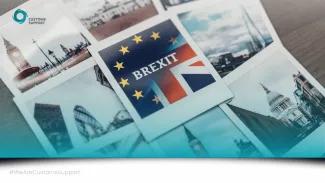L'effet de Brexit sur les entreprises au Royaume-Uni
Les entreprises du Royaume-Uni doivent non seulement faire face aux effets de la pandémie de COVID mais aussi à ceux de Brexit.
Bloomberg rapports:
Government officials acknowledge that logjams could mount as cross-channel flows return to normal levels from around 75% currently, though they don’t expect them to reach the worst-case scenarios modeled last year. They also say some difficulties are linked to the need for truckers to have a negative Covid test, rather than Brexit.
But businesses say what was once simple is now cumbersome. Documentation -- especially for loads with different types of goods from multiple suppliers, known as groupage -- is among the issues causing delays.
Et dans un autre article:
Cross-border goods trade with the European Union is almost back to normal levels, U.K. Transport Secretary Grant Shapps said, despite concerns from haulers that post-Brexit paperwork is choking their operations.
…
Some of the decline is down to stockpiling of goods in the run-up to the deadline of Dec. 31, when the U.K. left the EU customs and market regimes, he said. Only about 3% of trucks are being turned back as they try to leave and that is partly because drivers need to take coronavirus tests, Shapps told the panel.
Reuters rapports:
British manufacturers suffered a double hit last month as COVID-19 disruption to global shipping combined with new trade barriers with the European Union, according to a survey published on Monday.
…
Data firm IHS Markit said its monthly survey of the factory sector showed a hit to new export orders, signs of supply chain problems and inflation pressure.
Fhaheen Khan, an economist at Make UK, a manufacturing lobby group, said the worst of the supply chain challenges were yet to come as many manufacturers were still working down stockpiles.
“The impact of both COVID-19 and leaving the EU could linger for many years to come,” he said.
The Guardian écrit:
A survey by Make UK of its members shows that 60% of companies that said there were ready for Brexit “now experience disruption” and are “also finding supply chains significantly impacted.
Et The Guardian dans un autre article:
Hundreds of UK companies could switch operations to countries inside the EU in what is threatening to become a dramatic exodus of investment and jobs caused by Brexit.
The Observer can reveal that by 1 January this year some 500 businesses – mostly UK-owned, or UK-based with overseas owners – were already making inquiries about setting up branches, depots or warehouses in the Netherlands alone, for “Brexit-related reasons”. Since then the number of inquiries from UK companies has increased further.
If companies switch all or parts of their operations to Europe it will mean the loss of jobs, economic activity and tax revenue at home.
La frontière entre le Royaume-Uni et l'Irlande
Maintenant que le Royaume-Uni a quitté l'Union européenne, il y a une frontière difficile entre l'Irlande et le Royaume-Uni. La frontière entre l'Irlande du Nord et l'Irlande n'est pas une frontière rigide, tandis que l'Irlande du Nord fait toujours partie du Royaume-Uni. Le protocole sur l'Irlande du Nord garantit que cela est possible.
La BBC écrit:
Northern Ireland continues to follow many of the EU's rules, meaning lorries can drive across the border without being inspected.
However, there is a new "regulatory" border between Northern Ireland and Great Britain (England, Scotland and Wales). That's because, unlike Northern Ireland, Great Britain is no longer following EU law.
This means some checks on goods moving between Great Britain and Northern Ireland. Inspections take place at Northern Ireland ports and some have said this amounts to a border in the Irish Sea.
There have been calls to scrap the Northern Ireland Protocol, but the European Union and the Irish government are against this.
The Guardian rapports:
The Brexit agreement’s Northern Ireland protocol will not be scrapped, the Irish government and the EU have said in an escalating row over the new trade barriers down the Irish Sea.
…
Boris Johnson and Gove have capitalised on the EU’s embarrassment over the move and threatened to trigger article 16 themselves in parliament and in a letter to Šefčovič on Tuesday.
The UK is now demanding a two-year extension to the Brexit grace period for checks on trade but the EU made it clear last night it regarded article 16 as an ultimate on which it would not capitulate.
In the meantime the Irish Customs Authority has introduced a workaround for British exporters who are having trouble getting their goods across to Ireland with the proper paperwork.
La Maritime Executive rapports:
Ireland's customs agency has introduced a workaround for British exporters who are having trouble completing the paperwork required for international shipments between the UK and Ireland.
…
Customs challenges driven by Brexit have been predicted for years, and these difficulties are beginning to manifest on the UK's cross-channel ferry routes as well.
Rester informé
Suivez notre page LinkedIn Company pour vous tenir au courant de Brexit et d'autres questions liées aux douanes. Si vous avez des questions concernant les relations commerciales avec le Royaume-Uni, n'hésitez pas à nous contacter, car nous sommes heureux de vous aider !













